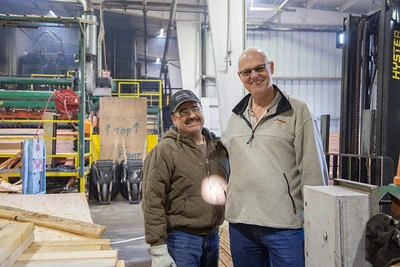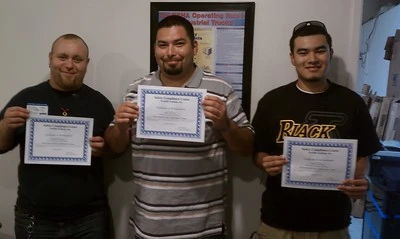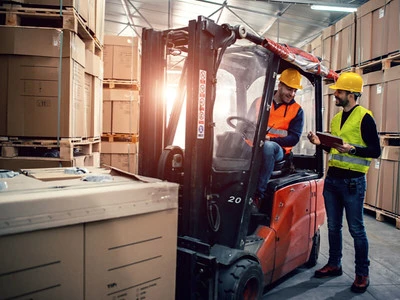How Long Does It Take To Get Good On A Forklift?
January 23, 2024 | by Mike Pattenson


Becoming proficient at operating a forklift typically involves both formal training and practical experience. The time it takes to become skilled can vary based on several factors, but here’s a general timeline with approximate durations:
- Formal Training: Forklift training programs, which include both theoretical and practical components, can range from about 1 to 5 days. This variation depends on the program’s depth, the type of forklift, and the complexity of the operations being taught.
- Certification Exam: After completing the training, operators generally need to pass a certification exam. This might take a day, depending on the testing process and the operator’s preparedness.
- On-the-Job Training: Once certified, operators often undergo on-the-job training. This period can last from a few days to several weeks. During this time, new operators apply their skills in a real-world environment, usually under supervision.
- Gaining Proficiency: Gaining comfort and proficiency can vary greatly among individuals. Some might feel competent after a month of regular operation, while others might need two to three months, especially in complex or demanding environments.
- Continuous Learning and Experience: Proficiency also includes adapting to different types of forklifts, loads, and environments, which is an ongoing process. Operators can continue to enhance their skills and efficiency over several months to a year.
The initial training and certification process can take about a week, but achieving proficiency and confidence can take anywhere from a month to several months, depending on the individual’s learning curve and the complexity of their working environment. Safety and efficiency are key components of forklift operation, and these skills are honed over time with experience and continuous learning.
Read related article: Is Online Forklift Certification Legit? (Let OSHA Answers This)
How Long Does It Take to Master Forklift?
It’s important to understand that mastery is not achieved within a fixed timeframe but rather through a combination of training, experience, and ongoing learning. Here are some key factors that influence the time it takes to master forklift operation:
- Prior Experience: Individuals with prior experience in operating heavy machinery or forklifts may progress more quickly. They already have a foundation of skills and knowledge to build upon.
- Training: Formal forklift training programs typically last a few days to a week. However, mastery goes beyond initial training. It involves continuous learning and skill development.
- Practice: Regular practice is essential for mastery. Spending time operating the forklift, especially in various scenarios and challenging situations, helps build expertise. Mastery often comes with years of hands-on experience.
- Complexity of Tasks: The complexity of tasks you’re required to perform in your specific work environment can influence the time it takes to master forklift operation. Handling simple loads may be mastered more quickly than dealing with intricate, high-stakes operations.
- Adaptability: Mastery also includes the ability to adapt to different forklift models and work environments. Becoming versatile in various settings takes time and exposure.
- Safety Consciousness: Being a master forklift operator means prioritizing safety at all times. This mindset should be continuously maintained and developed throughout your career.
- Ongoing Learning: Forklift technology and safety standards can evolve. Staying informed and participating in advanced training opportunities contribute to mastery.
While basic forklift operation skills can be acquired relatively quickly with formal training, true mastery is an ongoing process that involves years of practice, continuous learning, and a commitment to safety. It’s not defined by a specific timeframe but rather by your ability to operate a forklift safely, efficiently, and adaptably in various situations.
Ready to Rev Up Your Career with Forklift Certification?
Get Certified Online & Be Job-Ready Today! It’s Fast & Easy!
With our online course, getting certified is as easy as clicking, learning, and succeeding.
Don’t let another day go by without taking the next step in your career.
Read related article: Does OSHA Recognize Online Forklift Training?
How Can You Get Better At a Forklift
Regular practice is the cornerstone of improving your forklift skills. It’s where you can apply what you’ve learned and turn theoretical knowledge into practical proficiency. Here’s how to approach regular practice effectively:
Consistency is key. Try to establish a routine for your practice sessions. Whether it’s a daily, weekly, or monthly schedule, consistency helps you build and maintain your skills over time.
During your practice sessions, focus on a variety of tasks that challenge your abilities. This could involve stacking pallets at different heights, maneuvering through tight spaces, or handling various types of loads. By diversifying your practice tasks, you become more versatile and adaptable as an operator.
Take your time while practicing. Slow and deliberate movements are not only safer but also allow you to develop precise control over the forklift. As you gain confidence and expertise, you can gradually increase your speed.
Consider using forklift simulation software or training tools if they’re available. These tools provide a controlled and risk-free environment for practicing different scenarios, including challenging ones. They can be valuable for honing your skills and improving your decision-making.
If possible, practice under the supervision of an experienced forklift operator or a supervisor. Their guidance and feedback can be incredibly valuable. They can spot any unsafe habits or mistakes you might make and provide immediate corrections. Learning from someone with practical experience can significantly accelerate your progress.
Keep a record of your practice sessions to track your progress. Note areas where you’ve improved and areas where you still need work. This log can help you set goals for improvement and provide motivation as you see your skills develop over time.
In summary, regular and varied practice, along with careful attention to safety and feedback, is the path to becoming a skilled forklift operator. It’s through consistent practice that you’ll build the confidence and proficiency needed to excel in this role.
Read related article: Online Forklift Training: Step-By-Step Guide to Get Certified
Being Proficient
Gaining proficiency in forklift operation is a process that varies from one person to another. Initially, it involves learning the basic skills necessary to operate a forklift safely and effectively. This phase can take different amounts of time for different people, depending on various factors.
For example, someone with prior experience in similar machinery might pick up forklift skills faster than a complete novice. Additionally, how quickly an individual can learn new skills plays a significant role. Some might grasp the basics after just a few days of hands-on training, while others may need more time to feel comfortable with the controls and tasks.
The complexity of the tasks also matters; simple, straightforward operations can be mastered quicker than more complex maneuvers in challenging environments.
As operators gain more experience, they can move beyond just basic operation to advanced proficiency. This doesn’t just mean being able to drive the forklift; it includes mastering more intricate tasks, like maneuvering in tight spaces, handling different types of loads, and adapting to various working conditions.
Achieving this level of skill requires ongoing practice and often additional training. It’s a gradual progression from understanding the fundamentals to becoming highly skilled and versatile in forklift operation.
Taking the On-the-Job Training
On-the-job training is very important for getting better at using a forklift. It’s where you get to use the forklift for real, which helps you learn a lot. Usually, this training lasts for a few days to a few weeks.
During this time, it’s really helpful to have someone experienced, like a mentor or supervisor, to guide you. They can give you tips and make sure you’re using the forklift safely and correctly. This hands-on practice is a big part of becoming good at forklift operation.
As you keep practicing with the forklift during your on-the-job training, you start to understand how to handle different situations. This experience is vital because it’s not just about driving the forklift; it’s also about learning how to load and unload safely, move through tight spaces, and work efficiently.
Having a mentor or supervisor around is great because they can correct any mistakes you make and show you better ways to do things. They can also answer any questions you have and help you feel more confident as you learn. The time you spend in this training phase is crucial because it’s where you really start to feel comfortable and capable with the forklift, turning your basic skills into practical know-how.
Continuous Learning and Skill Enhancement
Continuous learning and skill enhancement are key parts of being a forklift operator. Even after you’ve learned the basics and have some experience, there’s always more to learn. Forklift operation isn’t just a one-time training thing; it’s an ongoing process where you keep improving and updating your skills.
There are often chances to get more training that can teach you advanced skills. This might include learning how to handle different kinds of loads or working in more challenging environments. Also, different places might have different types of forklifts, and it’s good to know how to operate various models.
Each work environment has its own set of challenges, so being able to adapt to different settings is a big part of being a skilled forklift operator. This could mean working in busy warehouses, outdoor sites, or places with special rules. By continuing to learn and grow your skills, you become more versatile and valuable as a forklift operator.
You Can Learn Operating Forklift Much Faster
you can learn how to operate a forklift more quickly if you put in the effort. Here’s how: get intensive training, practice a lot, and learn from experienced forklift drivers if you can. If you already know a bit about machines or have used a forklift before, it might be easier. Just remember, while learning fast is good, safety is the most important thing.
So, always be careful and follow the rules, even if you want to learn quickly. Balancing learning speed and safety is the key to becoming a skilled forklift operator faster.
getting good at forklift operation faster involves intensive training, lots of practice, and maybe some help from experienced operators. If you already know a bit about machines or have used a forklift before, that’s a plus. But don’t forget, safety always comes first.
Even if you want to learn quickly, make sure to follow all the safety rules. Finding the right balance between learning speed and safety is the key to becoming a better forklift operator in a shorter time.
Conclusion
Getting good at operating a forklift takes time and practice. While formal training is important, the real learning happens when you use the forklift regularly. How long it takes varies for each person.
Some learn faster if they have experience, while others may take longer. It’s like learning any skill; the more you practice, the better you become. The key is to keep learning, be safe, and always aim to improve. It’s a continuous journey of getting better at using the forklift.
Remember, there’s no fixed time frame for becoming good at forklift operation. It depends on your experience and how often you practice. The important thing is to be patient with yourself and focus on improving over time. Just like learning to drive a car, forklift operation becomes more comfortable and second nature with practice. Stay safe, keep practicing, and you’ll get better at using the forklift as you go along in your journey.
RELATED POSTS
View all



